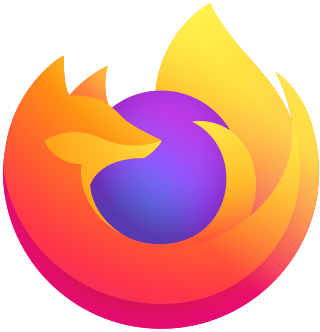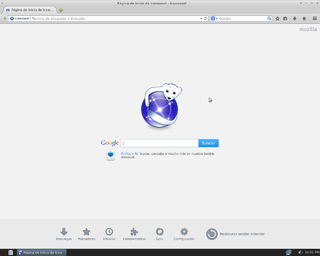
Open-source licenses are software licenses that allow content to be used, modified, and shared. They facilitate free and open-source software (FOSS) development. Intellectual property (IP) laws restrict the modification and sharing of creative works. Free and open-source licenses use these existing legal structures for an inverse purpose. They grant the recipient the rights to use the software, examine the source code, modify it, and distribute the modifications. These criteria are outlined in the Open Source Definition.

The Open Source Initiative (OSI) is a California public benefit corporation "actively involved in Open Source community-building, education, and public advocacy to promote awareness and the importance of non-proprietary software".
Gecko is a browser engine developed by Mozilla. It is used in the Firefox browser, the Thunderbird email client, and many other projects.

Mozilla Firefox is a free and open source web browser developed by the Mozilla Foundation and its subsidiary, the Mozilla Corporation. It uses the Gecko rendering engine to display web pages, which implements current and anticipated web standards. Firefox is available for Windows 10 and later versions of Windows, macOS, and Linux. Its unofficial ports are available for various Unix and Unix-like operating systems, including FreeBSD, OpenBSD, NetBSD, and other operating systems, such as reactOS. Firefox is also available for Android and iOS. However, as with all other iOS web browsers, the iOS version uses the WebKit layout engine instead of Gecko due to platform requirements. An optimized version is also available on the Amazon Fire TV as one of the two main browsers available with Amazon's Silk Browser.
The Mozilla Public License (MPL) is a free and open-source weak copyleft license for most Mozilla Foundation software such as Firefox and Thunderbird. The MPL is developed and maintained by Mozilla, which seeks to balance the concerns of both open-source and proprietary developers. It is distinguished from others as a middle ground between the permissive software BSD-style licenses and the GNU General Public License. As such, it allows the integration of MPL-licensed code into proprietary codebases, as long as the MPL-licensed components remain accessible under the terms of the MPL.

Free and Open source Software Developers' European Meeting (FOSDEM) is a non-commercial, volunteer-organized European event centered on free and open-source software development. It is aimed at developers and anyone interested in the free and open-source software movement. It aims to enable developers to meet and to promote the awareness and use of free and open-source software.
The Common Development and Distribution License (CDDL) is a free and open-source software license, produced by Sun Microsystems, based on the Mozilla Public License (MPL). Files licensed under the CDDL can be combined with files licensed under other licenses, whether open source or proprietary. In 2005 the Open Source Initiative approved the license. The Free Software Foundation (FSF) considers it a free software license, but one which is incompatible with the GNU General Public License (GPL).

Free and open-source software (FOSS) is software that is available under an open-source license that grants the right to use, modify, and distribute the software, modified or not, to everyone free of charge. The public availability of the source code is, therefore, a necessary but not sufficient condition. FOSS is also a loosely associated movement of multiple organizations, foundations, communities and individuals who share basic philosophical perspectives and collaborate practically, but might diverge in detail questions. The historical precursor to this was the hobbyist and academic public domain software ecosystem of the 1960s to 1980s. FOSS is an inclusive umbrella term for free software and open-source software. FOSS is in contrast to proprietary software, which consists of software under restrictive copyright or licensing as well as software with undisclosed source code.

In 2006, a branding issue developed when Mike Connor, representing the Mozilla Corporation, requested that the Debian Project comply with Mozilla standards for use of the Thunderbird trademark when redistributing the Thunderbird software. At issue were modifications not approved by the Mozilla Foundation, when the name for the software remained the same.
This comparison only covers software licenses which have a linked Wikipedia article for details and which are approved by at least one of the following expert groups: the Free Software Foundation, the Open Source Initiative, the Debian Project and the Fedora Project. For a list of licenses not specifically intended for software, see List of free-content licences.
Opposition to software patents is widespread in the free software community. In response, various mechanisms have been tried to defuse the perceived problem.

GNU IceCat, formerly known as GNU IceWeasel, is a completely free version of the Mozilla Firefox web browser distributed by the GNU Project. It is compatible with Linux, Windows, Android and macOS.
HTML video is a subject of the HTML specification as the standard way of playing video via the web. Introduced in HTML5, it is designed to partially replace the object element and the previous de facto standard of using the proprietary Adobe Flash plugin, though early adoption was hampered by lack of agreement as to which video coding formats and audio coding formats should be supported in web browsers. As of 2020, HTML video is the only widely supported video playback technology in modern browsers, with the Flash plugin being phased out.
WebM is an audiovisual media file format. It is primarily intended to offer a royalty-free alternative to use in the HTML video and the HTML audio elements. It has a sister project, WebP, for images. The development of the format is sponsored by Google, and the corresponding software is distributed under a BSD license.
A free license or open license is a license that allows copyrighted work to be reused, modified, and redistributed. These uses are normally prohibited by copyright, patent or other Intellectual property (IP) laws. The term broadly covers free content licenses and open-source licenses, also known as free software licenses.
Mozilla is a free software community founded in 1998 by members of Netscape. The Mozilla community uses, develops, publishes and supports Mozilla products, thereby promoting exclusively free software and open standards, with only minor exceptions. The community is supported institutionally by the non-profit Mozilla Foundation and its tax-paying subsidiary, the Mozilla Corporation.
Daala is a video coding format under development by the Xiph.Org Foundation under the lead of Timothy B. Terriberry mainly sponsored by the Mozilla Corporation. Like Theora and Opus, Daala is available free of any royalties and its reference implementation is being developed as free and open-source software. The name is taken from the fictional character of Admiral Natasi Daala from the Star Wars universe.
OpenH264 is a free software library for real-time encoding and decoding video streams in the H.264/MPEG-4 AVC format. It is released under the terms of the Simplified BSD License.

AOMedia Video 1 (AV1) is an open, royalty-free video coding format initially designed for video transmissions over the Internet. It was developed as a successor to VP9 by the Alliance for Open Media (AOMedia), a consortium founded in 2015 that includes semiconductor firms, video on demand providers, video content producers, software development companies and web browser vendors. The AV1 bitstream specification includes a reference video codec. In 2018, Facebook conducted testing that approximated real-world conditions, and the AV1 reference encoder achieved 34%, 46.2%, and 50.3% higher data compression than libvpx-vp9, x264 High profile, and x264 Main profile respectively.
Abhay Karandikar is an Indian educator, engineer, innovator, and administrator best known for his work in the telecommunication sector in India. Currently, he is serving as the Secretary to the Government of India in the Department of Science and Technology, Government of India from 1 October 2023 onwards. Previously, he served as the Director of Indian Institute of Technology, Kanpur from 1 April 2018 to 30 September 2023. Prior to that, Karandikar held a number of positions, including Dean, Head of the Department of the Electrical Engineering, and Institute Chair Professor at the Indian Institute of Technology, Bombay. He was one of the founding members of Telecom Standards Development Society of India and appointed as its first Vice Chairman from 2014 to 2016, and then was appointed its Chairman from 2016 to 2018. Karandikar contributed to conceptualization and establishment of new technical standards work programmes for TSDSI. In 2016, he was awarded with IEEE SA's Standards Medallion for his work to Indian Technology, Policy and Standardization with IEEE guidelines.







